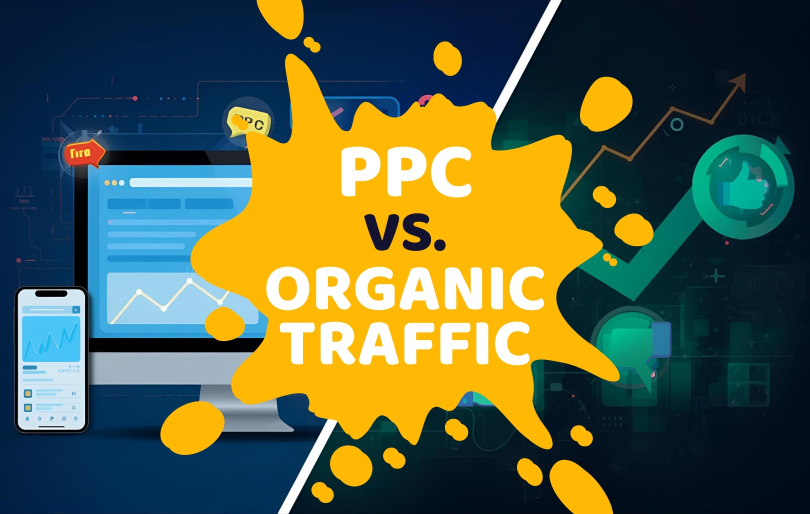PPC vs. Organic Traffic: Which Strategy Drives Better Results?
In the dynamic world of digital marketing, the debate between PPC (Pay-Per-Click) and organic traffic is a hot topic among entrepreneurs and marketers alike. Both strategies boast unique advantages, yet the question remains: which approach truly drives better results? This article compares PPC vs. organic traffic to help you determine the right path for your business. PPC offers instant visibility, placing your brand at the forefront of search engine results, but comes with a cost that can add up quickly. On the other hand, organic traffic, the ever-reliable powerhouse of long-term growth, requires a commitment to optimizing your content and understanding SEO principles. As you navigate through the intricacies of these two marketing avenues, it’s essential to weigh the potential ROI, target audience engagement, and long-term sustainability. Join us as we delve into the strengths and weaknesses of PPC and organic traffic, helping you determine the right strategic path for your business and unlock the best results in an increasingly competitive digital landscape.
Understanding the Basics: PPC vs. Organic Traffic
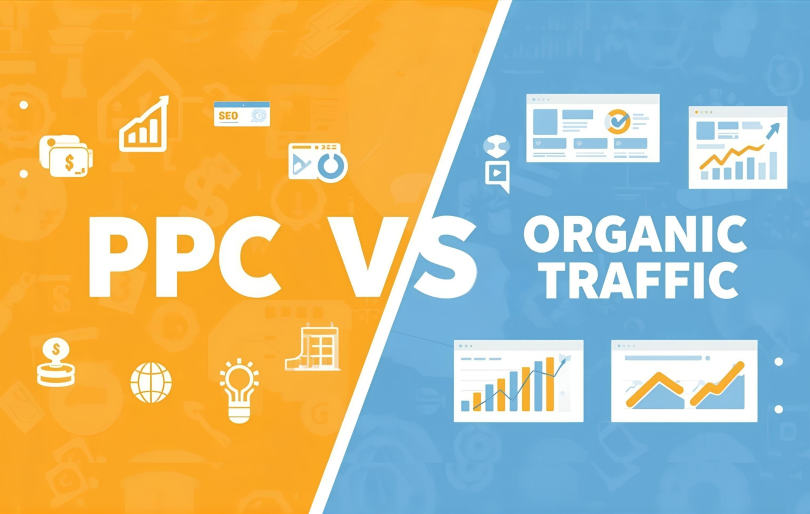
To navigate the world of digital marketing effectively, understanding the foundational concepts of PPC (Pay-Per-Click) and organic traffic is crucial. PPC is a model of internet marketing where advertisers pay a fee each time one of their ads is clicked. Essentially, it’s a way to buy visits to your site, rather than attempting to earn those visits organically. For deeper insight, review how Google Ads help businesses grow in 2025. Search engine advertising is one of the most popular forms of PPC. It allows marketers to bid for ad placement in a search engine’s sponsored links when someone searches on a keyword related to their business offering. For example, if we bid on the keyword “PPC vs. Organic Traffic,” our ad might show up at the top of the Google results page.
On the flip side, organic traffic refers to the visitors who land on your website as a result of unpaid (“organic”) search results. Organic traffic is generated when users find your site through a search engine like Google, without you having to pay for placement. This involves the use of SEO (Search Engine Optimization) techniques to improve your site’s visibility and ranking. SEO strategies include optimizing content for keywords, improving site architecture, and building backlinks. The goal of SEO is to attract a steady stream of visitors over time, as opposed to the more immediate, but often short-lived, influx of traffic provided by PPC.
Both PPC and organic traffic play critical roles in a well-rounded digital marketing strategy. While PPC offers immediate results by placing your brand at the top of search results almost instantly, organic traffic builds a sustainable presence that can deliver consistent traffic and engagement over the long term. Understanding these basic principles is the first step in determining which strategy, or combination of strategies, will best meet your business goals.
Key Differences Between PPC and Organic Traffic
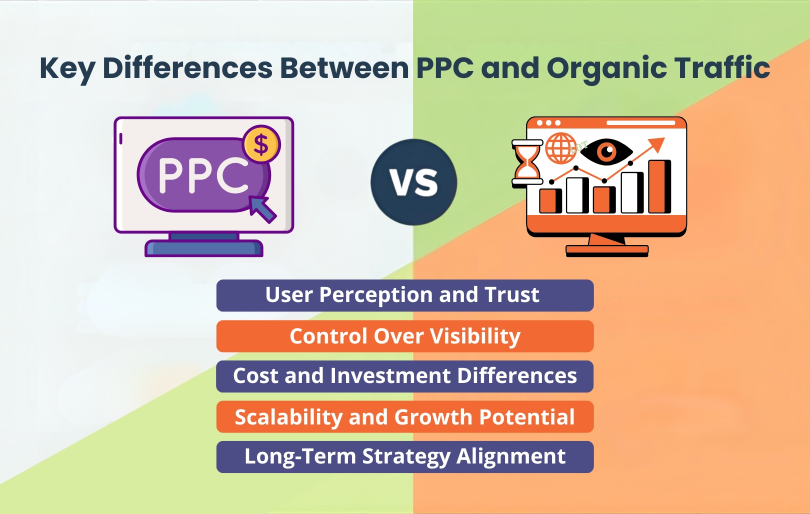
When comparing PPC and organic traffic, it’s important to look beyond cost and speed. Each strategy impacts user trust, visibility, and scalability differently. Understanding these distinctions will help businesses choose the right approach for their goals and long-term growth.
User Perception and Trust
Organic results are often seen as more credible because they rank based on relevance and quality, not budget. This is why many businesses invest in 2025 SEO practices to ensure long-term organic credibility. PPC ads, while visible instantly, can appear less trustworthy to users who prefer engaging with naturally earned search results.
Control Over Visibility
With PPC, advertisers enjoy full control over when, where, and how ads appear, allowing precise targeting. Organic traffic, however, depends on evolving search engine algorithms, limiting control but rewarding strong SEO with lasting visibility.
Cost and Investment Differences
PPC delivers instant results but requires continuous ad spend to maintain traffic. Organic growth is slower but builds long-term authority and visibility without ongoing costs per click, making it a sustainable investment for many businesses.
Scalability and Growth Potential
PPC can be scaled instantly with increased budget, ideal for short-term campaigns. Organic traffic demands consistent optimization and patience but offers sustainable growth that continues to deliver results even without constant financial input.
Long-Term Strategy Alignment
Choosing between PPC and organic traffic depends on business goals. PPC suits companies seeking immediate visibility and conversions, while organic SEO is better for long-term brand credibility, sustainable growth, and cost-effective digital marketing success.
Benefits of PPC Advertising
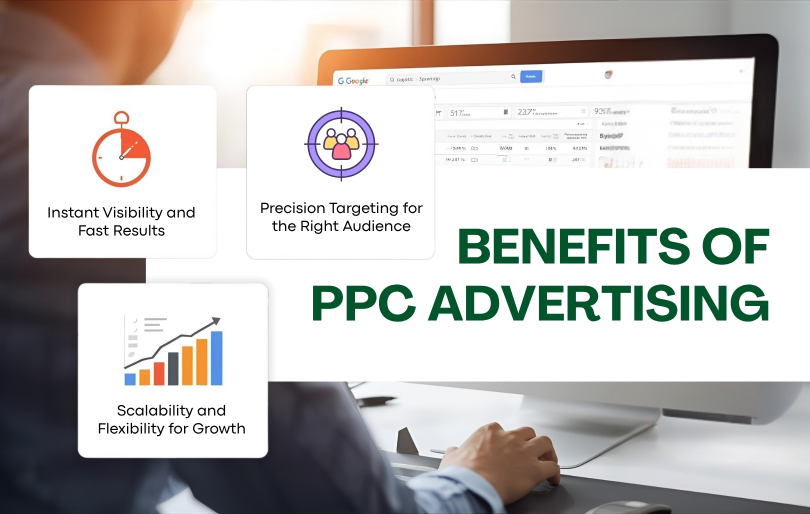
PPC advertising provides businesses with immediate visibility, precise targeting, and scalable growth opportunities. Unlike organic strategies that take time to build, PPC campaigns deliver instant results, making them a powerful tool for brands aiming to boost traffic, leads, and sales quickly.
1. Instant Visibility and Fast Results
One of the standout benefits of PPC advertising is speed. Brands often rely on guides like Google Ads for business to maximize campaign effectiveness. As soon as your campaign goes live, your ads appear on search engine results pages (SERPs), instantly driving traffic. This makes PPC ideal for product launches, seasonal promotions, or time-sensitive marketing campaigns.
2. Precision Targeting for the Right Audience
PPC gives businesses full control over who sees their ads. From keyword targeting to demographics, location, device, and time of day, you can reach the exact audience most likely to convert, ensuring every click has a higher chance of delivering ROI.
3. Scalability and Flexibility for Growth
With PPC, scaling campaigns is as simple as increasing your budget. This flexibility allows brands to capitalize on trends, respond to competitor actions, or quickly adjust underperforming ads. The result: measurable, adaptable growth tailored to business objectives.
Advantages of Organic Traffic
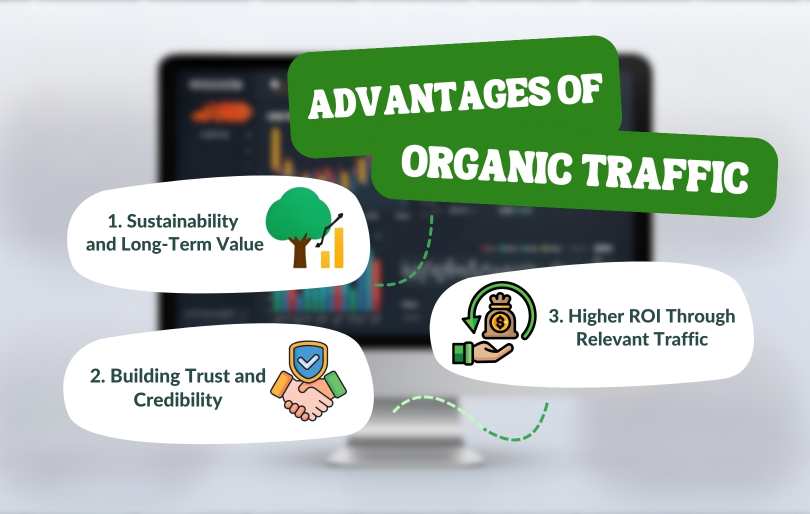
Organic traffic is one of the most valuable assets in digital marketing, offering sustainable growth without continuous ad spend. By building a strong SEO foundation, businesses can enjoy long-term visibility, credibility, and conversions that paid campaigns alone cannot provide.
1. Sustainability and Long-Term Value
Unlike paid campaigns that stop driving traffic once the budget ends, organic rankings can generate consistent visitors for months or even years. Quality content, keyword optimization, and link-building provide compounding results, making organic traffic a cost-effective growth strategy.
2. Building Trust and Credibility
Users naturally trust organic search results more than paid ads, associating higher rankings with authority and relevance. This credibility not only improves click-through rates but also increases conversions, as visitors perceive your brand as a trusted leader in its industry.
3. Higher ROI Through Relevant Traffic
Organic traffic attracts users actively searching for products or services like yours, ensuring relevance and higher engagement. This targeted audience is more likely to convert, providing a stronger long-term return on investment compared to paid campaigns with ongoing costs.
Cost Comparison: PPC Advertising vs. Organic SEO
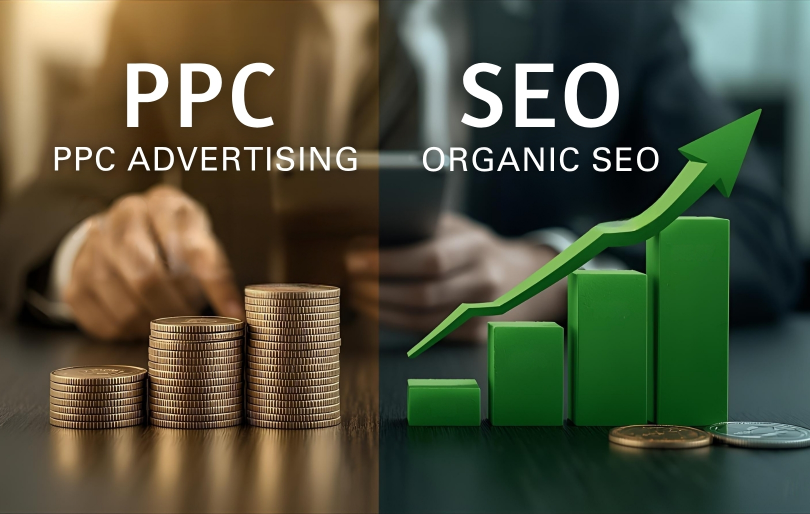
When it comes to cost, PPC advertising and organic SEO present two very different financial landscapes. PPC requires a direct financial investment where you pay for each click on your ad. A full breakdown can be found in our local SEO costs resource. The cost per click (CPC) can vary widely depending on the competitiveness of the keywords you’re targeting. High-demand keywords can be quite expensive, potentially costing several dollars per click. Additionally, the total cost of a PPC campaign can add up quickly, especially if you’re aiming for high visibility and a broad reach. However, the immediate returns and the ability to control your budget and targeting make PPC a compelling option for businesses that can afford the upfront investment.
On the other hand, organic SEO typically involves more indirect costs. While you don’t pay for each visitor that comes through organic search, there are costs associated with optimizing your website. These can include expenses for hiring SEO experts, investing in SEO tools, and creating high-quality content. The upfront costs for SEO can be substantial, but they are often spread out over time as part of a long-term strategy. Unlike PPC, where the costs are ongoing and directly tied to your budget, the investment in SEO can continue to yield benefits long after the initial work has been done, leading to a more sustainable and cost-effective approach in the long run.
A crucial factor to consider is the return on investment (ROI) for each strategy. PPC can deliver a high ROI in the short term due to its immediate impact. However, the ongoing costs can eat into your profits if not managed carefully. Organic SEO, while slower to show results, often delivers a higher ROI over time because the traffic generated is “free” once you’ve achieved a good ranking. The cumulative effect of a strong organic presence can far outweigh the initial investment, making it a more financially sustainable option for long-term growth. Ultimately, the best approach may depend on your specific business needs, budget, and growth goals.
Timeframe for Results: Instant vs. Long-Term
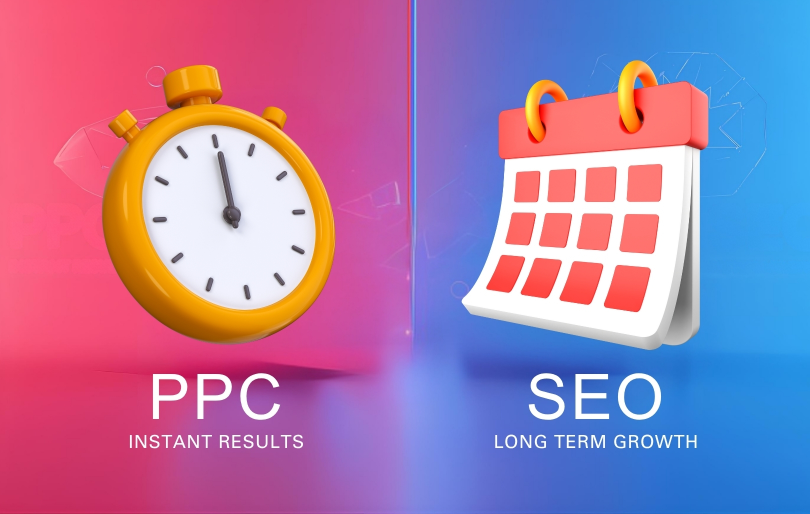
One of the most significant differences between PPC and organic SEO is the timeframe for seeing results. PPC offers almost instant visibility. As soon as you launch a PPC campaign, your ads can start appearing in search results, driving traffic to your website immediately. This immediacy is invaluable for businesses looking to quickly generate traffic, leads, or sales. For example, if you’re launching a new product or running a time-sensitive promotion, PPC allows you to get your message in front of potential customers right away. The ability to rapidly test and adjust your campaigns also means you can optimize your performance in real-time, ensuring you get the best possible return on your investment.
In contrast, organic SEO requires a more patient approach. Achieving high rankings in search engine results takes time and consistent effort. It can take several months to see significant improvements in your organic search rankings, especially for competitive keywords. The process involves optimizing your website, creating high-quality content, and building backlinks, all of which contribute to improving your site’s authority and relevance in the eyes of search engines. While the initial phase of SEO can be slow, the long-term benefits are substantial. Once you’ve established a strong organic presence, you can enjoy a steady stream of traffic without the ongoing costs associated with PPC.
The difference in timeframe also impacts your overall marketing strategy. PPC is well-suited for short-term goals and campaigns that require immediate results. It allows you to quickly adapt to market changes and seize opportunities as they arise. On the other hand, organic SEO is more aligned with long-term objectives. It focuses on building a sustainable online presence that can continue to drive traffic and generate leads over time. For many businesses, a balanced approach that leverages the immediacy of PPC while investing in the long-term growth of organic SEO can provide the best of both worlds, ensuring both immediate and sustained success.
Combining PPC and Organic Traffic for Maximum Impact
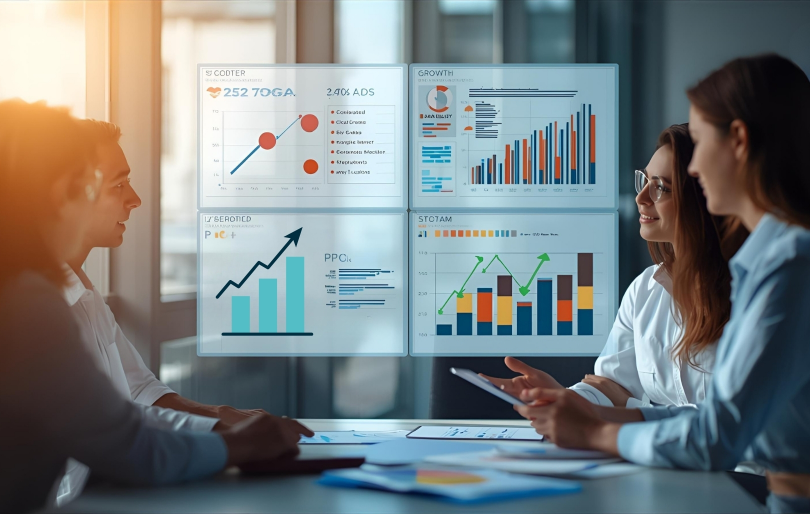
While PPC and organic traffic each have their unique strengths, combining both strategies can create a powerful synergy that maximizes your overall digital marketing impact. Using PPC and SEO in tandem allows you to capitalize on the immediate benefits of paid advertising while building a sustainable organic presence. For example, PPC can provide instant visibility and traffic, giving your brand a quick boost while your SEO efforts are still gaining traction. This dual approach ensures that you’re not solely reliant on one source of traffic, reducing your risk and increasing your overall reach.
One effective way to combine PPC and organic traffic is through keyword synergy. By analyzing the performance of your PPC campaigns, you can identify high-performing keywords that drive traffic and conversions. These insights can then inform your SEO strategy, helping you optimize your content for the same keywords to improve your organic rankings. Conversely, your organic keyword data can help you discover new opportunities for PPC campaigns, allowing you to target keywords that you might not have considered otherwise. This cross-pollination of data ensures that both your PPC and SEO efforts are aligned and working towards the same goals.
Another advantage of combining PPC and organic traffic is the ability to dominate search engine results pages (SERPs). By appearing in both paid and organic search results, you can increase your brand’s visibility and credibility. Users are more likely to trust and engage with brands that appear multiple times in search results, leading to higher click-through rates and conversions. Additionally, the presence of your ads alongside your organic listings can help reinforce your brand message and drive more traffic to your site. This comprehensive approach allows you to capture a larger share of the search traffic and achieve maximum impact with your digital marketing efforts.
Conclusion: Choosing the Right Strategy for Your Business Goals
Deciding between PPC and organic traffic ultimately depends on your specific business goals, budget, and timeline. PPC offers the advantage of immediate visibility and the ability to quickly drive traffic and conversions. It’s an excellent choice for businesses looking to achieve rapid growth, launch new products, or run time-sensitive promotions. The precision targeting and real-time data provided by PPC campaigns allow for agile adjustments and optimization, ensuring that you can maximize your return on investment.
Organic traffic, on the other hand, provides a sustainable and cost-effective approach to building an online presence. While it requires a longer timeframe and consistent effort, the benefits of organic SEO can yield significant long-term results. High-quality, optimized content can attract a steady stream of visitors, build credibility, and enhance your brand’s reputation. Organic traffic aligns well with content marketing strategies, focusing on providing value to users and fostering meaningful engagement.
In many cases, a balanced approach that leverages both PPC and organic traffic can deliver the best results. By combining the immediacy of PPC with the sustainability of organic SEO, you can create a comprehensive digital marketing strategy that addresses both short-term and long-term goals. This integrated approach allows you to capitalize on the strengths of each strategy, ensuring a steady flow of traffic, leads, and conversions.
Ultimately, the key to success lies in understanding your unique business needs, setting clear objectives, and continuously monitoring and optimizing your campaigns. Whether you choose PPC, organic traffic, or a combination of both, a well-executed digital marketing strategy can help you navigate the competitive landscape and achieve your business goals. For expert guidance tailored to your campaigns, explore Adzeem pay-per-click services today. As the digital marketing ecosystem continues to evolve, staying informed and adaptable will be crucial in driving the best results for your business.
